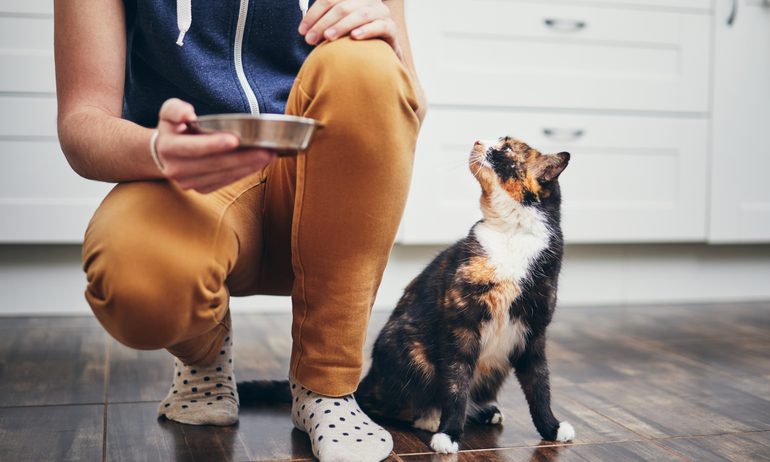Does Pet Insurance Cover Prescription Food?
While some pet insurance policies offer coverage for prescription pet food, many do not.

Many, or all, of the products featured on this page are from our advertising partners who compensate us when you take certain actions on our website or click to take an action on their website. However, this does not influence our evaluations. Our opinions are our own. Here is a list of our partners and here's how we make money.
Prescription pet food is often recommended for specific health conditions.
Not all pet insurance policies cover prescription food.
There are alternative ways to save on prescription food if your pet insurance plan doesn’t cover it.
When your pet faces a medical issue, your vet may prescribe a special diet to help manage the condition. While prescription pet food can be a critical part of your furry friend's treatment plan, it can also come with a hefty price tag. If you're wondering whether pet insurance covers the cost of prescription pet food, the answer is: It depends on the provider.
What is prescription food for pets?
Prescription diets are formulated to address specific health conditions in pets, ranging from allergies to kidney disease. Unlike regular pet food, these generally require a vet's prescription, ensuring they're fed to pets who genuinely need them.
Your vet might recommend a prescription diet if your pet has conditions like:
Arthritis.
Food allergies.
Kidney issues.
Obesity.
Heart problems.
Diabetes.
These diets cater to the pet's unique nutritional needs and can help manage or treat their condition. They usually come with a higher price tag than standard pet food.
For example, we compared prices on Chewy, an online pet food supplier, for two brands of dog food from Hill’s Science Diet. A 15-pound bag of standard adult breed kibble was selling for $48.99 per bag while a 17.6-pound bag of prescription food formulated for kidney care had a price tag of $99.99.
Does pet insurance cover prescription pet food?
Some pet insurance plans cover prescription food, but it’s important to read the fine print. Your policy might cover prescription diets under certain conditions or up to a specific limit. Typically, your vet must prescribe the food for a specific medical condition affecting your pet. It usually can’t be for general health or weight management.
Here's a quick overview of where some popular pet insurance companies stand on prescription food coverage. Note that pet insurance plans and coverage often vary by state, so you’ll want to double-check before buying a policy.
Pet insurance company | Covers prescription food in standard plan? | Covers prescription food through add-on? |
|---|---|---|
Sometimes. | No. | |
Yes. | No. | |
Rarely. | Yes. | |
No. | No. | |
No. | Yes. | |
No. | No. | |
Yes. | No. | |
Sometimes. | Sometimes. | |
No. | No. | |
Yes. | No. | |
Yes. | No. | |
Yes, for a limited time. | No. |
» MORE: What does pet insurance cover?
AKC’s prescription food coverage
AKC won’t cover most pet food, but it makes an exception for prescription diets used as the sole treatment for a covered condition. So if your veterinarian prescribes a special diet to manage your pet's condition, AKC will consider covering the cost.
ASPCA’s prescription food coverage
ASPCA’s Complete Coverage plan will pay for your pet’s prescription diet as long as it’s used to treat a covered prescription. The plan won’t pay for a weight management diet.
Embrace’s prescription food coverage
Embrace generally doesn't include prescription food coverage in its standard insurance plans. One exception may be if your vet prescribes a certain type of diet for hyperthyroidism in cats. But if you enroll in the optional Wellness Rewards program, you can get reimbursed for prescription diets purchased through your vet. The Wellness Rewards program also covers other routine expenses like wellness exam fees and vaccines.
Fetch’s prescription food coverage
Fetch doesn’t offer coverage for prescription food.
Figo’s prescription food coverage
Figo offers optional “Powerups” that you can add to its standard accident and illness plan. One of them reimburses you for vet exam fees and will pay up to $250 per policy term for food prescribed as the sole treatment for a covered illness. So if your dog is diagnosed with an ailment that requires a special diet and your vet prescribes a therapeutic food as the only treatment, this rider can help offset the cost.
Healthy Paws’ prescription food coverage
Healthy Paws doesn’t cover the cost of prescription food.
MetLife’s prescription food coverage
MetLife covers prescription pet food from a veterinary provider under its standard accident and illness plan in most states.
Nationwide’s prescription food coverage
Nationwide may cover prescription food under certain plans or with an extra rider. If it’s included, the food must be a therapeutic diet prescribed by a veterinarian to treat a covered medical condition. Your vet may need to provide Nationwide with details about the type of food, which condition it’s treating and how much you should feed your pet.
Pets Best’s prescription food coverage
Pets Best doesn’t cover prescription pet food or supplements.
Pumpkin’s prescription food coverage
Pumpkin pays for food and supplements that are prescribed by your vet to treat a covered prescription. It won’t cover food used for general health or weight control.
Spot’s prescription food coverage
Spot's core pet insurance plan includes coverage for prescription food and supplements when they’re prescribed by a licensed veterinarian to treat covered conditions. However, Spot doesn’t cover prescription food used for general maintenance or weight management, or any food you can buy without a vet’s prescription.
Trupanion’s prescription food coverage
Trupanion covers prescription pet foods for dogs and cats when they’re prescribed by a licensed veterinarian for the treatment of a covered illness or injury. This coverage reimburses 50% of the cost for the first two months of the prescribed diet. After that, you’ll pay the full cost out of pocket.
Pet insurance usually excludes pre-existing conditions. So if your pet was already on a prescription diet before you bought your policy, it probably won’t be covered.
How does prescription food coverage work?
First, check your policy details to make sure prescription food is covered and see what restrictions apply. To find this information, look in the fine print and read through your plan's endorsements.
If it's covered, you’ll generally pay upfront for the food and then submit a claim to your insurance company. The insurer would reimburse you according to your plan's terms.
For example, if your dog develops kidney disease, your veterinarian may prescribe a special low-protein diet. After buying the prescribed food, you'd submit the receipt and any other requested documentation to your insurer. Depending on your plan, you might be reimbursed for a percentage or up to a certain limit of the food’s cost. If you haven’t met your deductible, the insurer may subtract that amount from your claim payout.
Other ways to save on prescription food
Prescription pet food can be a game changer for pets with certain health issues. But if your policy doesn't offer coverage, there are other ways to make these diets more affordable. Consider:
Buying in bulk or during sales.
Asking your vet about different brands or alternative treatments that might cost less.
Joining loyalty programs or subscribing to regular deliveries for discounts.
Exploring homemade diet options (with guidance from your vet).
ON THIS PAGE
ON THIS PAGE





